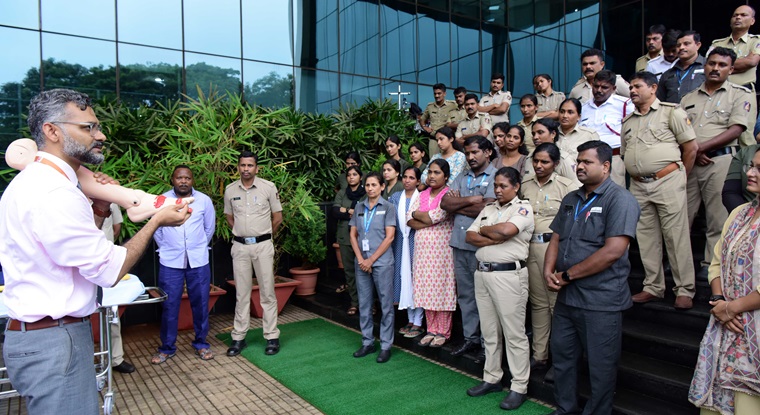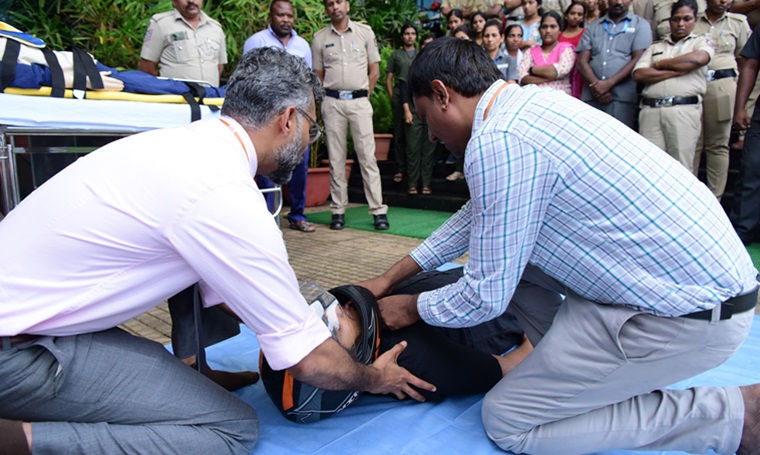First responder’s workshop on multiple trauma wound management
July 22, 2024
The first responder workshop on multiple trauma wound management was organized by the Manipal Center for Interprofessional Advanced Wound Care, the Center for Resuscitation, Acute Care and Simulation Training (CReST), and the Center for Clinical and Innovative Forensics. The workshops used simulation to build capacity, which is urgently needed to ensure prompt and efficient initial care, which can significantly lessen the severity of injuries and even save lives. By stabilizing patients, wisely allocating resources, and averting problems, trained responders can increase community resilience in emergencies. The program was officially opened by Mr Parameshwar A. Hegde, the additional superintendent of police, Udupi. He made a serious point about the competencies of quick response teams as first responders. He brought out the necessity of more training of a comparable grade to establish Udupi as a distinct area that offers an evidence-based strategy for several traumas in town.
The team put together a unique workshop that was well received by the police department, KMC Manipal & Mangalore, Allied institute, Kasturba Hospital staff, MCON, Basic Medical Science department, and nurses from the UK who are observing the Indian scenario of first response to trauma. Dr. Tessy Treesa Jose, Associate Dean of MCON, MAHE Manipal, praised the team for their efforts. Professor Selvam Watts, The Director of iWound Global, expressed his views on being human to treat and manage wounds innovatively. He nailed it, saying that healthcare professionals and the community must work harder together to make a difference in the community.
The case-based simulation was used by emergency medicine professor Dr Vimal Krishnan and nurse practitioner Mr Prasannakumara of Kasturba Hospital Manipal to place participants in first responder roles throughout various trauma situations. Additionally, Dr. Vimal emphasized the "Communicate-Awareness-Regulation-Education" (CARE) methodology. This model places a strong emphasis on the value of effective communication, situational awareness, knowledge of legal terminology, and ongoing education.
Learning by doing things has a significant impact. Dr Vimal with his humorous teaching strategies, made learning enjoyable.
Dr. Vinod Nayak, a forensic sciences professor, used cases to highlight the legal responsibilities and the things that first responders need to be aware of. He also emphasized the need to have empathy, help at the scene of trauma right away, and avoid apathy when taking pictures and videos to post on social media. Breaking the neglected attitude towards reasons for not helping road crash victims needs public awareness. In India, population and accidents matter in its strategic management, and this calls for an innovative approach.
Participants received instruction on how to treat burn injuries using first aid from Dr. Tanvi Rao, Assistant Professor, Department of Plastic Surgery, KMC, Manipal. "Burns First Aid Saves Lives." She emphasized that 70% of burns happen at home, highlighting the significance of prompt and efficient first aid in these circumstances. She also brought attention to skin banking and its many advantages for those who have burn injuries.
Enhancing the capabilities of healthcare workers in wound management is imperative, as stressed by Dr. Elsa Sanatombi Devi, the Director of MAHE FAIMER International Institute and the Coordinator of the Manipal Center of Excellence in Interprofessional Advanced Wound Care. She emphasized how crucial it is to improve the effectiveness and ease of wound care for people who need help managing their wounds, be they acute or chronic. Mr Shreenidhi Jogi and Ms Effienia D Wahlang, PhD scholars working in innovative wounds, coordinated the simulation experiences of the participants. To improve practical comprehension and response abilities, 61 participants participated in the workshop that featured realistic situational learning exercises.






